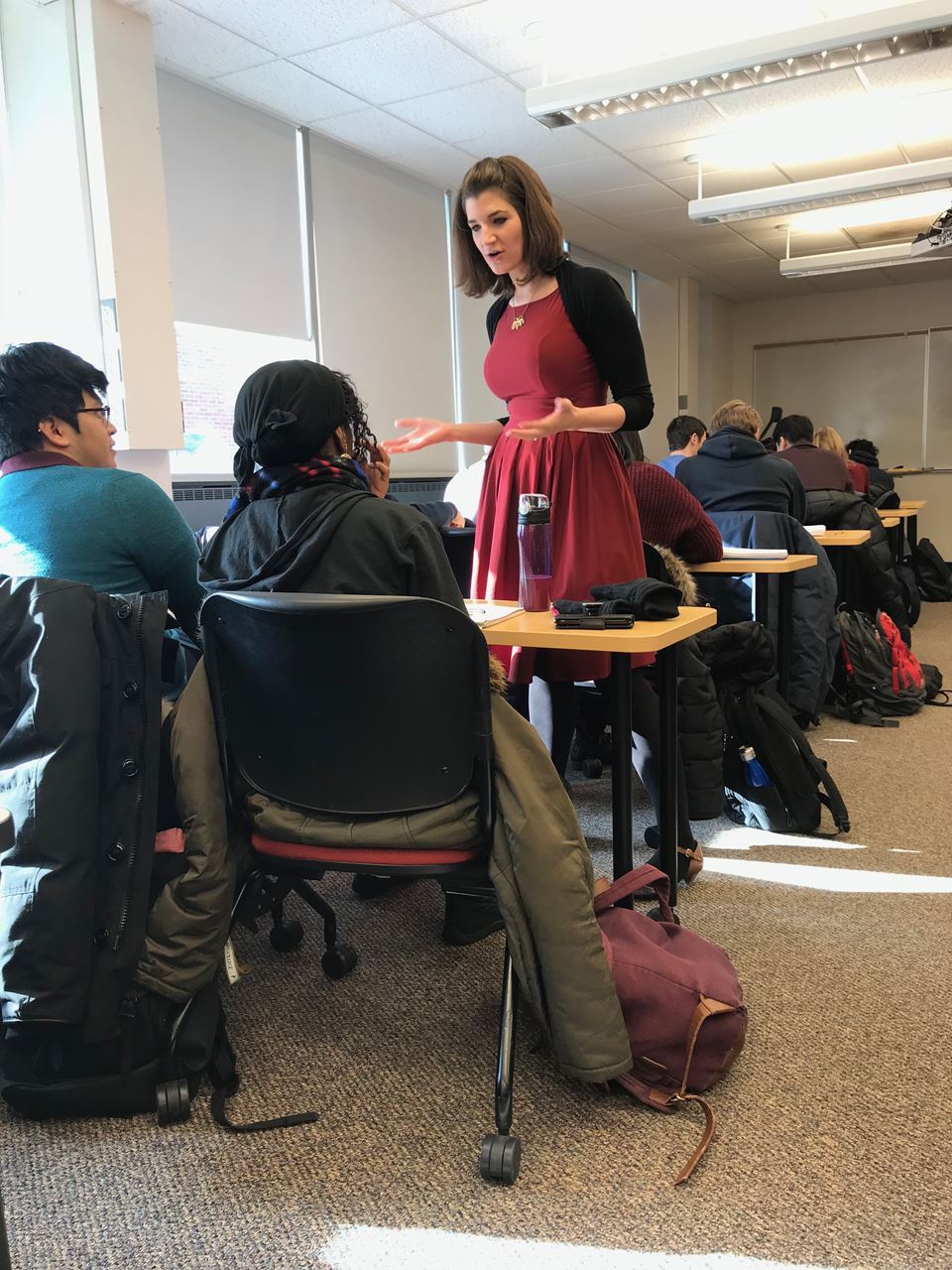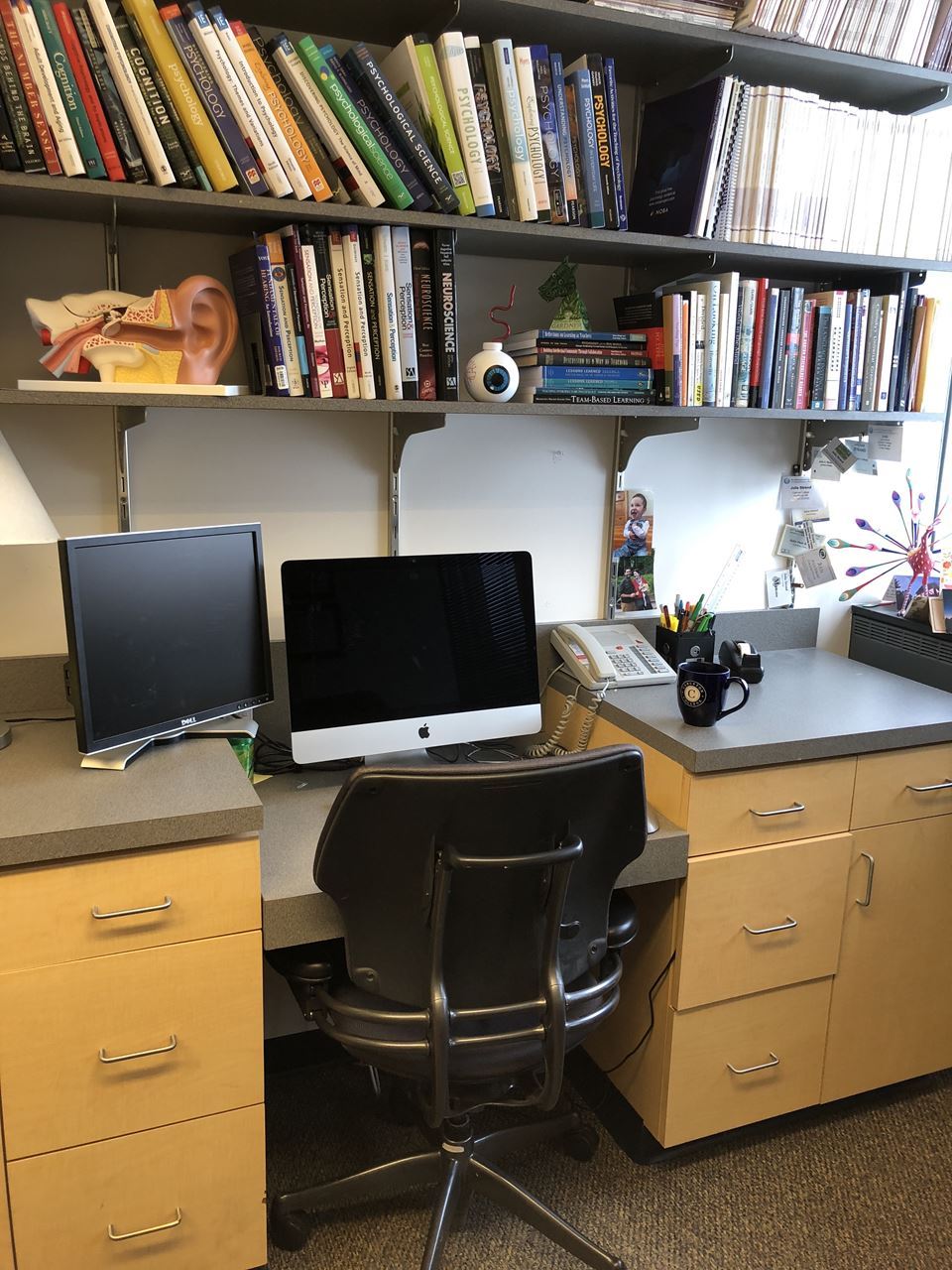 School name: Carleton College
School name: Carleton College
Type of school: private liberal arts college
School locale: small town (~20k) Northfield, Minnesota
Classes you teach:
Principles of Psychology, Sensation & Perception with lab, Human Expertise, Psychology of Spoken Words
Average class size: 15 (seminar) – 35 (introductory course)
What’s the best advice about teaching you’ve ever received?
“Bring yourself into the classroom.” When I first started teaching I felt like I had to maintain a formal, professorial demeanor. Once I gave that up and embraced my more informal, zany style, I had more fun, and the students did too. I regularly give examples from my own life - sharing my perspectives and being open with students seems to help them be more comfortable with me and willing to ask for help.
What book or article has shaped your work as a psychology teacher?
Teaching Introductory Psychology: Survival Tips from the Experts. It was the first teaching book I ever read and I still regularly think of the advice in it. One suggestion it gives that I try to use regularly is to teach by telling stories. For instance, when I introduce the idea of localization of function in our neuroanatomy unit, I begin with, “In the spring of 1861, a man was admitted to a hospital outside Paris. He was only able to speak a single syllable, but could do it with inflection and expressive hand gestures,” and then go on to describe Leborgne meeting Broca and what we have since come to learn about the neuroanatomy of language production. Telling the detailed story of a single person seems to engage students and make them more curious about a particular phenomenon.
Briefly tell us about your favorite lecture topic or course to teach.
I love all my courses equally, but Sensation & Perception is a favorite. This involves teaching students basic, factual information (e.g., anatomy of the inner ear), processes (e.g., how acoustic signals are translated into neural code in the inner ear), and more high-level abstract concepts (e.g., how we recognize spoken words). Sensation & Perception is also quite interdisciplinary, and I like getting to draw on psychology, neuroscience, physics, and philosophy all in the same course. It's also a lot of fun to get to explain familiar phenomena like why people have the flavor preferences they do, why being drunk makes you dizzy, why spicy food burns, etc.
 Briefly describe a favorite assignment or in-class activity.
Briefly describe a favorite assignment or in-class activity.
On the first day of my intro psych class, I give small groups of students a fictional research summary to evaluate. They all receive the same brief introduction and methods section, but different groups get different (contradictory) results. I ask students to explain why the outcome occurred and whether it is what they would have predicted. Over the years I’ve been doing the exercise, 76% of students have reported that they would have predicted the results, despite the fact that there the two outcomes were contradictory. I use this to demonstrate hindsight bias and emphasize the importance of empirical testing, because our intuitions can’t always be trusted. (If any future students are reading this - don’t wreck my demo, ok?)
What teaching or learning techniques work best for you?
In a typical class period, I’ll lecture for 10-15 minutes, then ask students to work in small groups to answer discussion questions, solve a problem, design an experiment, or apply something from the reading or lecture to a novel issue. We then discuss as a class and repeat the process. I like moving back and forth between a more traditional lecture format and more flexible, small group work. The discussion time also gives students who are nervous about asking questions in front of the whole class an opportunity to talk to me one-on-one.
 What’s your workspace like?
What’s your workspace like?
Typically tidy, but with cups of tea and whatever I’m reading close to my computer.
Three words that best describe your teaching style.
Enthusiastic, interactive, rigorous.
What is your teaching philosophy in 8 words or fewer?
Hook ‘em and they’ll work to learn it.
Tell us about a teaching disaster (or embarrassment) you’ve had and how you dealt with the situation.
The teaching issues that stick with me tend to be the minor, but more frequent missed opportunities. I’ll sometimes realize after a class period (or even a whole course) that there was a much better way to present information, a clearer example to give, or a more interesting way to frame a problem. I have to work hard not to kick myself for missing an opportunity to have done something better. Luckily, there’s always next time!
What is something your students would be surprised to learn about you?
In college, I was premed until I failed the first few tests in intro bio. I considered going to grad school for linguistics. I came very close to quitting my PhD program. I think career paths are much less straight than students assume.
What are you currently reading for pleasure?
Vacationland by John Hodgman
What tech tool could you not live without?
I rely on GQueues for task management, Slack for team communication, GoogleDocs for collaboration, Dropbox for storage, and R for data analysis.
What is your hallway chatter like? What do you talk to colleagues about most (whether or not it is related to teaching/school)?
These days it’s mostly about my two small kiddos and who is sick with what that day. When it’s not the middle of Minnesota winter, I also find myself talking about running and outdoor adventures, movies, my art, and what is going on around town.
